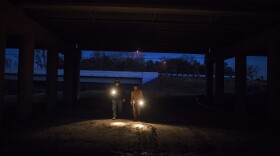On Wednesday, the U.S. Department of Housing and Urban Development (HUD) marked 50 years since President Lyndon Johnson signed the law that created the agency, a part of Johnson’s Great Society program.
And, as part of the celebrations, HUD Secretary Julian Castro visited the University of Texas at Austin’s LBJ School of Public Affairs Wednesday.
When President Johnson created HUD 50 years ago, he delivered a speech.
"When our nation was born, the only departments were state, treasury and war,” he said.
What LBJ saw at the time was a highly urbanized nation full of disparity and inequality, and he made efforts to create departments, like HUD, that would address some of those needs.
"We must seek and we must find the ways to preserve and to perpetuate in the city the individuality, the human dignity that has been part of the American character," Johnson said.
Watch President Johnson deliver his speech below:
On Wednesday, Secretary Castro said that if LBJ were alive, he'd probably point to the 50 years of work HUD has done and say:
"'Mister Secretary, we've made progress, but we're nowhere close to being done.’ Then, he'd probably throw in a few curse words just for effect,” Castro said.
The secretary said if HUD wants to be more effective in eradicating disparity and inequality, it must do more to hold cities that receive federal funds accountable.
In Austin, some of the housing intended for people who are homeless comes from programs funded by HUD.
Over the summer, the possibility was raised of withholding HUD funding to push cities to reevaluate policies targeting the homeless.
Secretary Castro mentioned this possibility in his speech Wednesday as well.
The U.S. Department of Justice said in a brief last month that criminalizing people who are homeless for being homeless is unconstitutional. The DOJ argues that’s because it criminalizes their condition, not their behavior.
Advocates argue that Austin’s "no sit/no lie" ordinance — which penalizes people who sleep on the street or who sit on downtown's public benches for more than 30 minutes straight — criminalizes homelessness.
People with criminal records aren't eligible for government-subsidized housing, so if people who are homeless are charged with crimes, it will inhibit their ability to find housing.
"I do believe that the Justice Department has made a very good point about the criminalization of homelessness. And my hope is that more and more cities that are criminalizing homelessness in effect – will take a second look – will re-examine their policies and improve them,” Castro said.
But Austin Mayor Steve Adler says the city's no sit/no lie ordinance is not the problem.
"Ultimately what we need to be focused on – what this council needs to focus on – because it is truly the core of the issue, it is the answer to solving the problem and not just addressing the symptom, is to focus on getting people homes,” Adler says.
That’s something easier said than done. According to the city's latest report on homeless, almost 2,000 people live on Austin's streets. Adler has initiated a program to house all of Austin's homeless veterans by November of this year — something that, if achieved, would make some progress in reducing Austin's homeless population.









